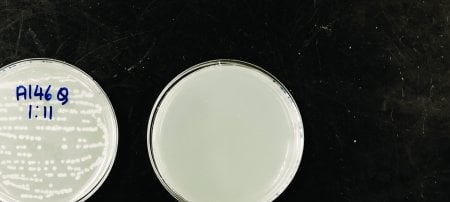Cells are as efficient as possible, but when little errors crop up, big mistakes can happen. Meet the Michigan Tech researcher cracking the protein code.
Anyone can make a small mistake; it isn't until a bunch of these errors team up over time that a really big problem develops. This is true everywhere, from paper cranes to cells. Ashutosh Tiwari is researching how small errors in protein folding lead to cellular inefficiency and contribute to the onset of diseases we frequently associate with aging—and what can be done to correct them.
Unlike neat diagrams in textbooks, which show big gaps between cellular components like the nucleus and mitochondria, cells are a jumble. And yet, fighting disease requires combating a specific cause at a specific part of the cell—no easy feat.
Tiwari is examining how errors in protein folding lead to cellular inefficiency and contribute to the onset of diseases associated with aging. He and his team are developing the tools to find and correct the mistakes by targeting the right error, or misfold.
"Imagine going sixty miles per hour on a country road. No problem, right? It's easy to see everything, maintain speed, and get where you're going. Now try to drive at that high speed in the center of a busy city. There's so much traffic that it will be impossible to maintain the speed, and very little room for error while you're driving."Ashutosh Tiwari
Thanks to modern medicine, our population is living longer. However, this increased longevity has brought new challenges from diseases like Alzheimer's, Parkinson's, Huntington's, and ALS. This is due in part to declining proteostasis—the cycle of efficiently producing and recycling proteins within a cell—capability, leading to the disruption of protein function or misfolding due to oxidative stress, aging, or other factors.
"Increased oxidative damage of proteins associated with aging causes them to misfold and aggregate, and thus, disorders related to protein misfolding and aggregation are on the rise," says Tiwari.
Cells are, by necessity, highly efficient with materials. Some proteins, like signaling proteins, last just a few seconds, while others, like the fibrous proteins in muscle, can last a year or more depending on their purpose. But errors in the recycling process can lead to a buildup of misfolded proteins that are highly hydrophobic, meaning they have sites on them that are very sticky, collecting nearby materials that the cell cannot then recycle.

These sticky sites take away from cell function, and as these errors accumulate over time, a broad variety of diseases become increasingly likely to be triggered, despite the fact that they are not related in root cause.
Tiwari's lab has studied fluorescent dyes to better measure the hydrophobic nature in some of the proteins. They have tested new dyes made in collaboration with Professor Haiying Liu's research group that are tenfold more sensitive in measuring hydrophobicity than the commonly used dye ANS. Their work has led to better detection of protein misfolding errors with newly formulated dye compounds.
With molecular crowding playing a central role in how misfolded proteins behave, untangling this jumble is the first step to getting help where it is needed within the cell. Understanding the factors that regulate protein misfolding and their relationship to cellular toxicity will help us develop tools to combat these issues and formulate effective therapeutic strategies.
Michigan Technological University is an R1 public research university founded in 1885 in Houghton, and is home to nearly 7,500 students from more than 60 countries around the world. Consistently ranked among the best universities in the country for return on investment, Michigan's flagship technological university offers more than 120 undergraduate and graduate degree programs in science and technology, engineering, computing, forestry, business, health professions, humanities, mathematics, social sciences, and the arts. The rural campus is situated just miles from Lake Superior in Michigan's Upper Peninsula, offering year-round opportunities for outdoor adventure.




